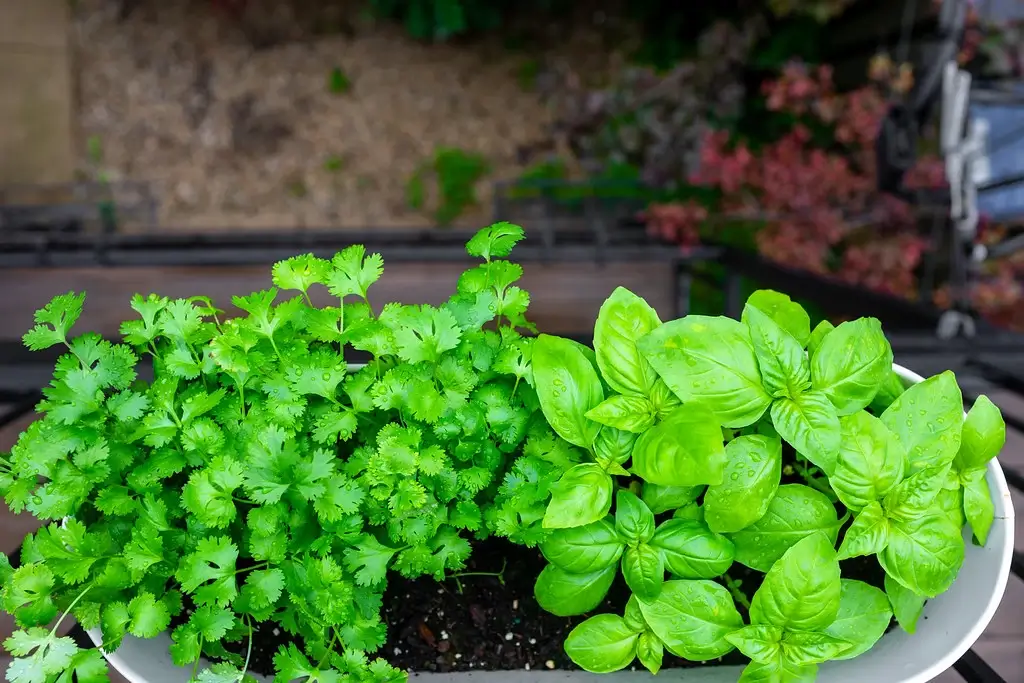
Guide To Eco-friendly Pest Control
By Steven Green | August 15, 2023
The issue of pest control is one that necessitates careful consideration to ensure minimal harm to the environment. Traditional approaches often involve the use of harmful chemicals, which can have detrimental effects on both human health and the ecosystem.
This article serves as a comprehensive guide for individuals seeking alternative, eco-friendly methods of managing pests. Eco-friendly pest control methods prioritize natural and sustainable solutions.
This introduction aims to captivate the audience by highlighting the significance of this topic and its potential impact on environmental preservation.
Introduction
The benefits of eco-friendly pest control methods include reduced environmental impact, improved air and water quality, and protection of beneficial insects and wildlife.
By avoiding the use of harmful chemicals and pesticides, eco-friendly pest control methods help to preserve the natural ecosystem and promote biodiversity.
Additionally, these methods are generally safer for humans and pets, as they do not pose the same health risks as traditional pest control methods.
Furthermore, eco-friendly pest control can be more cost-effective in the long run, as it focuses on preventing pest infestations rather than relying on constant treatments.
Finally, using eco-friendly pest control methods can contribute to a more sustainable and healthier living environment for both individuals and communities.
However, it is important to consider the potential drawbacks of these methods to make informed decisions. Some eco-friendly pest control methods may require more time and effort to be effective, and they may not provide immediate results.
Additionally, the effectiveness of these methods can vary depending on the pest species and the severity of the infestation.
Despite these potential drawbacks, the benefits of eco-friendly pest control make it a worthwhile option for those who are concerned about the environment and their health.
SUBSCRIBE
Benefits of eco-friendly pest control
A primary advantage of utilizing environmentally conscious methods for managing pests is their reduced impact on the surrounding ecosystem. Eco-friendly pest control methods offer a range of benefits, including effectiveness, cost-efficiency, and sustainability.
These alternatives to traditional pest control often rely on natural ingredients and techniques that are less harmful to the environment. For instance, using plant herbs or spices can repel pests without introducing toxic chemicals into the ecosystem. Additionally, food waste can be used as an insect repellent, reducing both waste and the need for chemical pesticides.
Natural substances like boric acid, essential oils, vinegar, and diatomaceous earth are also effective in controlling pests while minimizing harm to non-target organisms. By adopting eco-friendly pest control strategies, individuals can not only protect their homes but also contribute to a healthier and more sustainable environment.
Transitioning into the subsequent section about ‘downsides of traditional pest control,’ it is important to consider alternative approaches due to these significant advantages.
Downsides of traditional pest control
Traditional methods of pest management have several drawbacks that should be considered when exploring alternative approaches. These methods often involve the use of chemical pesticides, which can have negative impacts on human health and the environment.
Chemical exposure through direct contact, inhalation, or consumption of contaminated food can lead to various health risks, including respiratory problems, skin irritations, and even long-term effects such as cancer. Furthermore, the indiscriminate use of chemical pesticides can harm non-target organisms and disrupt ecological balance.
Over time, pests may develop resistance to these chemicals, rendering them less effective in controlling infestations. In light of these concerns, it is crucial to explore eco-friendly alternatives such as using plant herbs for pest control.
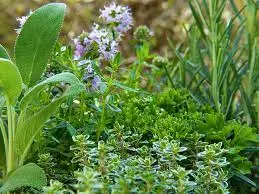
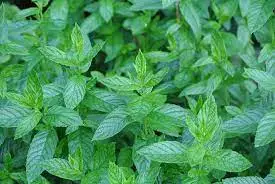
Herbs
Harnessing the natural repellent properties of certain plants, such as herbs, can provide a more sustainable approach to pest management. Using herbs for pest control has several benefits, including being an eco-friendly and chemical-free method.
Herb gardens can serve as natural pest control systems by attracting beneficial insects that prey on pests or by repelling pests with their strong scents. Popular herbs known for repelling pests include basil, lavender, mint, rosemary, and thyme.
These herbs not only add beauty and fragrance to the garden but also serve as effective deterrents against insects like mosquitoes, flies, moths, and ants. To maximize their effectiveness in pest control, it is important to plant these herbs strategically throughout the garden and regularly maintain them through pruning or harvesting.
Spices
Spices, when utilized strategically in pest management practices, offer a potential alternative to traditional methods by harnessing their natural repellent properties. Using spices for pest control provides numerous benefits, including their availability, cost-effectiveness, and safety compared to chemical pesticides.
Various spice combinations have been found effective in repelling pests such as ants, flies, and mosquitoes. For example, cinnamon and cloves are known for their ability to deter ants, while peppermint oil is an effective mosquito repellent.
Other natural spices commonly used for pest control include garlic powder, cayenne pepper, and black pepper. These spices can be used individually or in combination to create safe alternatives that effectively repel pests without harming the environment or human health.
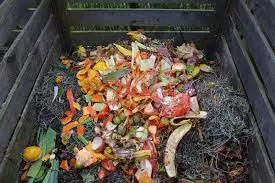
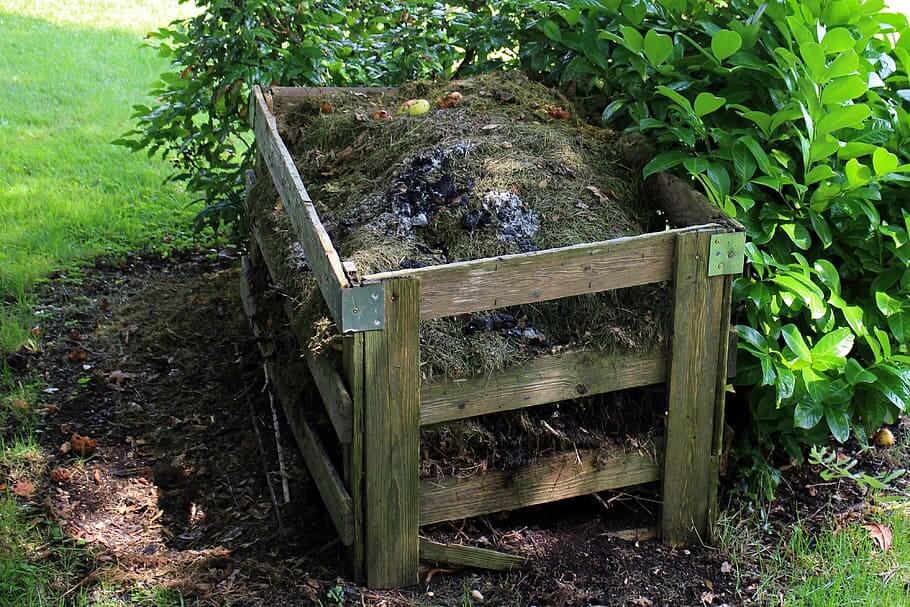
Food waste
One alternative method to manage pests involves utilizing food waste as an insect repellent, which can provide an eco-friendly and cost-effective approach. Food waste repellent is a DIY insect repellent that utilizes natural ingredients to deter pests from infesting homes or gardens.
By repurposing food waste, this method promotes natural pest control and reduces the need for harmful chemicals typically used in traditional pest control. This eco-friendly pest prevention technique aligns with the principles of organic pest management and offers a sustainable solution for those seeking to minimize their environmental impact.
However, while using food waste as an insect repellent can be effective in certain cases, it may not provide complete eradication of pests. Therefore, it is important to consider incorporating additional methods such as the use of boric acid for a more comprehensive approach to pest management.
Vinager and Essential oils
Essential oils and vinegar are often considered as effective alternatives to traditional pest control methods due to their insect-repellent properties and minimal risks associated with their use. Essential oil blends, such as those containing peppermint, lavender, or eucalyptus oil, have been found to repel various pests including mosquitoes, ants, and flies.
These oils can be mixed with water and used as DIY insect sprays or added to natural cleaning solutions for a dual-purpose approach. Vinegar also offers multiple benefits in pest control. Its strong odor acts as a deterrent for insects like ants and spiders, making it useful for wiping down surfaces or spraying in problem areas.
Additionally, vinegar’s acidity can disrupt the reproductive cycle of certain pests. By incorporating essential oils and vinegar into your eco-friendly pest control routine, you can effectively manage unwanted insects without exposing yourself to harmful chemicals.

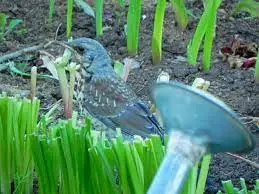
Attract birds
Attracting birds to your garden or backyard habitat can provide a natural and effective method for controlling pests. Birds are natural predators of insects, rodents, and other small animals that can cause damage to plants and crops. Creating a bird-friendly environment can encourage these helpful creatures to take up residence in your garden.
Here are some ways to attract birds for natural pest control:
- Install birdhouses: Providing nesting sites will attract birds to your garden.
- Use bird feeders: Offering food sources like seeds, suet, or nectar can entice birds to stay.
- Plant trees and shrubs: These provide shelter and nesting opportunities for birds.
- Provide water sources: Birdbaths or shallow dishes with fresh water will attract birds.
- Create diverse habitats: Incorporate different plant species and structures into your garden to attract a variety of bird species.
By attracting birds to your garden, you can enjoy the benefits of natural pest control without relying on harmful chemicals.
Humane traps
To address the issue of rodent infestation in an environmentally conscious manner, one can utilize humane traps as a means to capture and relocate these pests. Humane trapping methods aim to minimize harm to the animals while effectively controlling their population.
There are various rodent relocation techniques available that promote eco-friendly rodent control and humane pest removal. These methods involve using non-lethal traps designed to safely capture rodents without causing them injury or distress.
Once captured, the rodents can then be released into more suitable habitats away from human dwellings. By adopting such sustainable pest management practices, individuals can contribute to the overall well-being of ecosystems while addressing their own pest control needs.
Microbial insecticides
Microbial insecticides are a promising option for managing pest populations. They utilize microorganisms to target and control specific pests in an environmentally sustainable manner. These microbial applications offer an effective alternative to traditional chemical pesticides, which can be harmful to human health and the environment.
Biological control using microbial insecticides involves the use of naturally occurring microorganisms such as bacteria, fungi, viruses, or protozoa. These microorganisms specifically target and kill pests while leaving non-target organisms unharmed. Pest management strategies based on these organic pest control methods have gained popularity due to their potential for long-term sustainability.
Microbial insecticides can be applied directly onto crops or used as bait traps to disrupt pest lifecycles. They provide an eco-friendly approach that minimizes the risk of pesticide resistance development in pest populations. Transitioning into the subsequent section about diatomaceous earth, another sustainable pest control method is the use of this natural substance derived from fossilized remains of aquatic organisms.
Diatomaceous earth
Diatomaceous earth is a natural substance derived from the fossilized remains of aquatic organisms. It can be used as an effective and environmentally sustainable method for pest management. Uses of diatomaceous earth include killing insects by damaging their exoskeletons, controlling pests like fleas, ticks, ants, and bedbugs, eliminating parasites in livestock and pets, preventing stored grain infestations, and deterring slugs and snails in gardens.
Application methods of diatomaceous earth include dusting it on affected areas or mixing it with water to create a spray. There are several benefits of using diatomaceous earth. It is non-toxic to humans and pets, has a long-lasting residual effect, is safe for use in organic farming, is an environmentally friendly alternative to chemical pesticides, and is effective against a wide range of pests.
Safety precautions when using diatomaceous earth include wearing gloves and masks to avoid inhalation and eye contact. In comparison to other pest control methods, diatomaceous earth offers numerous advantages such as its non-toxic nature, environmental sustainability, and versatility in targeting various pests effectively.
Conclusion
In conclusion, eco-friendly pest control offers a sustainable and natural approach to managing pests without harming the environment. By utilizing herbs, spices, natural pesticides, microbial insecticides, and humane traps, individuals can effectively repel or eliminate pests while minimizing environmental damage.
The benefits of eco-friendly pest control are clear: it protects human health, preserves the ecosystem, and promotes a healthier planet for future generations. It is ironic that traditional pest control methods often rely on harmful chemicals that have detrimental effects on both humans and the environment.
By embracing eco-friendly alternatives, we can create a harmonious balance between pest management and environmental preservation.

